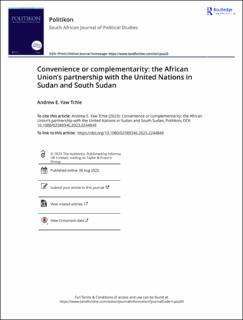Convenience or complementarity: the African Union’s partnership with the United Nations in Sudan and South Sudan
Journal article, Peer reviewed
Published version
Permanent lenke
https://hdl.handle.net/11250/3083432Utgivelsesdato
2023Metadata
Vis full innførselSammendrag
Over the past 20 years, the United Nations (UN) and the African Union (AU) have developed aunique partnership rooted in complementarity, respect and African ownership. To reaffirmthis partnership, the United Nations Secretary-General and Chairperson of the AfricanUnion (UN) Commission signed a Joint UN-AU framework for Enhanced Partnership inPeace and Security in 2017. Nevertheless, despite previous lessons learned, gaps incollaboration and strategic thinking, and oversight exist on the ground between the AUand the UN. Drawing on the case(s) of Sudan and South Sudan to further understand theAU’s partnership with the UN through the lens of complementarity and convenience, thepaper arrives at a novel conceptualisation of the AU and UN partnership through theirpolitical missions. The paperfinds that the AU-UN framework is sporadically implemented,and the AU’s role in the partnership on the ground is one of convenience, whereas, incontrast, the UN’s role is one of complementarity aimed at achieving legitimacy. The paperconcludes that both organisations in-country were constrained by the lack of collaborationand synergy, which led to a misalignment of joint priorities, impacting the effectiveness ofthe partnership.

